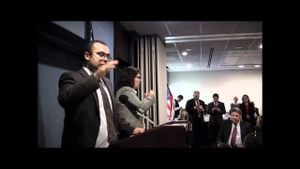During a recent press conference held on February 19, 2023, Ukrainian President Volodymyr Zelensky addressed pressing issues surrounding the financial assistance provided by the United States amid the war with Russia. One of the most contentious points raised was the classification of this aid, particularly the distinction between grants and debts.
Zelensky took a firm stance on what he referred to as inflated figures concerning Ukraine's debt to the US. "Now it's 500 billion. Let’s clarify the figure first. I know we had 100. And that's a fact. I am not even ready to account for 100 billion," he stated. This quote underscored his insistence on reevaluated figures circulating concerning Ukraine’s financial obligations to its allies.
Throughout the press conference, Zelensky clarified Ukraine’s position on these grants, reiteratively emphasizing, "We cannot regard grants as debt, whether we like it or not; I negotiated with Biden, and I thank Congress for this bipartisan support, and grants cannot be debts.” His comments aim to solidify Ukraine's argument against recognizing the financial aid as debt obligations, reinforcing the notion of support being provided under mutual agreements rather than strictly financial liabilities.
He stressed, "This is not about the figure; it's about not recognizing it as debt," indicating the core of the debate is not merely numerical but theological — determining Ukraine’s financial future and its sovereignty.
Zelensky also mentioned the overall economic impact of the war on Ukraine, stating, "the war has cost us $320 billion. From this, $120 billion is from the Ukrainian people and taxpayers, and $200 billion is from the US and EU partnerships." This financial breakdown highlights the urgent need for transparent discussions surrounding international aid and investment.
The president noted the importance of aid as Ukraine grapples with both conflict and recovery, stating, "If the condition today is such, where our strategic partners say: we will give you assistance, but you must return it with profit for the United States, then that's an agreement, not grants. That's new negotiations, and I said I am ready for such dialogue." This willingness to engage indicates Ukraine's preparedness to adapt to the changing dynamics of international support.
Zelensky’s remarks also touched upon the timeline for peace. He expressed optimism about the potential for ending the hot phase of the war, stating, "The United States will do everything to end the hot stage of the war this year. I believe this is their goal, and they will strive for it," emphasizing the seriousness of the conflict and its timeline.
To aid these endeavors, discussions continue on how international support may evolve, particularly as Congress in the US debates future allocations and strategies. Zelensky appeals for enhanced clarity and commitment from the US, urging partners to remain steadfast as Ukraine navigates these turbulent waters.
President Zelensky’s comments are not just directed at the immediate situation but seem to call for more strategic planning for Ukraine’s economic future and stability post-war. His insistence on distinguishing grants from debts allows for potentially more favorable terms for Ukraine, reflecting its broader social and economic strategies as the war continues. Looking to improve the current narrative, Zelensky’s leadership emerges as pivotal to how Ukraine may maneuver during and after the conflict.



